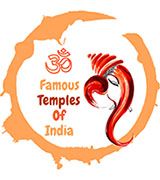Arattupuzha Temple | Arattupuzha Sree Sastha Temple
The Arattupuzha Temple, also known as Arattupuzha Sree Sastha Temple, is a Hindu temple situated at Arattupuzha in Thrissur district of Kerala, India. It is dedicated to Lord Ayyappa, who is believed to be the embodiment of Dharma Sasta, a combination of Shiva and Vishnu. The temple is administered by the Cochin Devaswom Board.
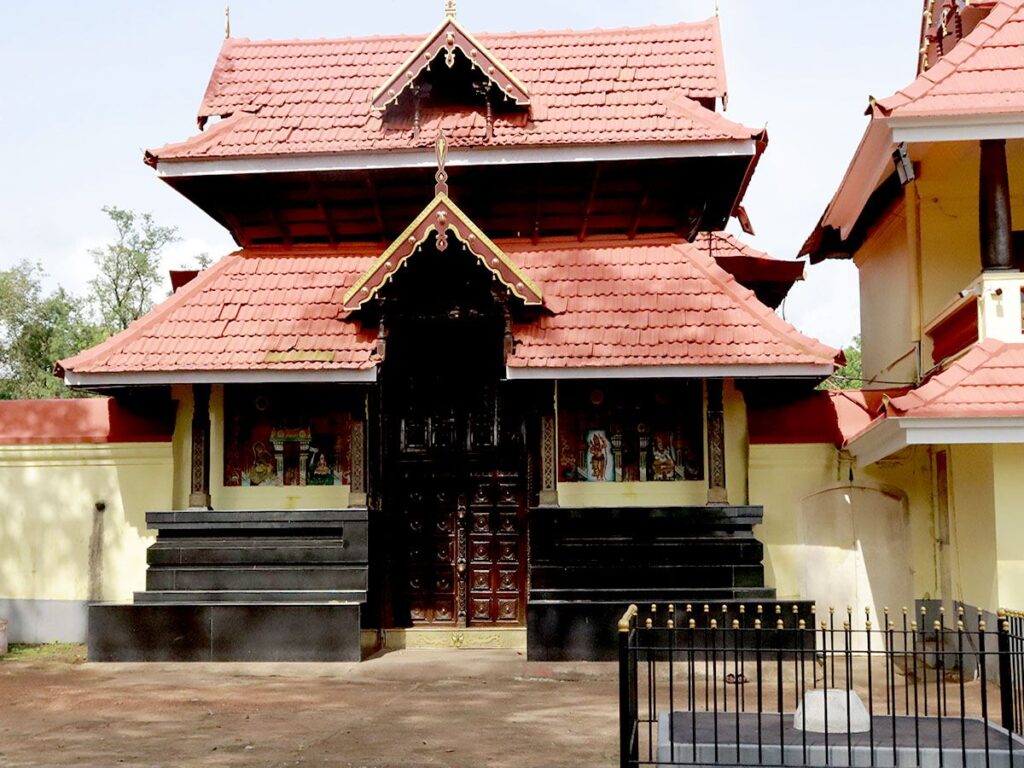
Contents
Arattupuzha Pooram History:
The history of Arattupuzha Pooram is a blend of tradition, religious beliefs, and possible evolution over time. Here’s what we know:
Ancient Origins:
- Historical accounts suggest the Arattupuzha Pooram is an ancient festival, possibly dating back 1,400 years or even further – up to 3,000 years according to some legends. This makes it one of the oldest temple festivals in all of India.
- References exist in historical records from the Peruvanam temple, suggesting the Pooram might have been interrupted for a period but revived over 600 years ago.
Evolution of the Festival:
- Legends say that historically, a much larger number of deities (as many as 108) from surrounding temples participated in the Pooram. Today, 23 deities are the main participants.
- There’s a local saying, “Even a hundred Thrissur Poorams can’t match the grandeur of Arattupuzha Pooram’s lamp oil,” hinting at the festival’s past scale and importance.
“Devamela” – The Gathering of Gods:
- Arattupuzha Pooram is known as “Devamela,” translating to “The Conclave of Gods.” This reflects the belief that it’s a grand gathering where deities from various temples assemble.
- This gathering signifies the rich tapestry of traditions and the unifying spirit of the festival.
Uncertainties and Mysteries:
- While there are historical references and local legends, pinpointing the exact origin and evolution of the festival remains somewhat unclear.
Continuing Legacy:
- Despite some uncertainties, Arattupuzha Pooram continues to be a vibrant celebration, showcasing Kerala’s cultural heritage through colorful processions, adorned elephants, and rhythmic performances.
Read More>> Karikkakom Sree Chamundi Devi Temple
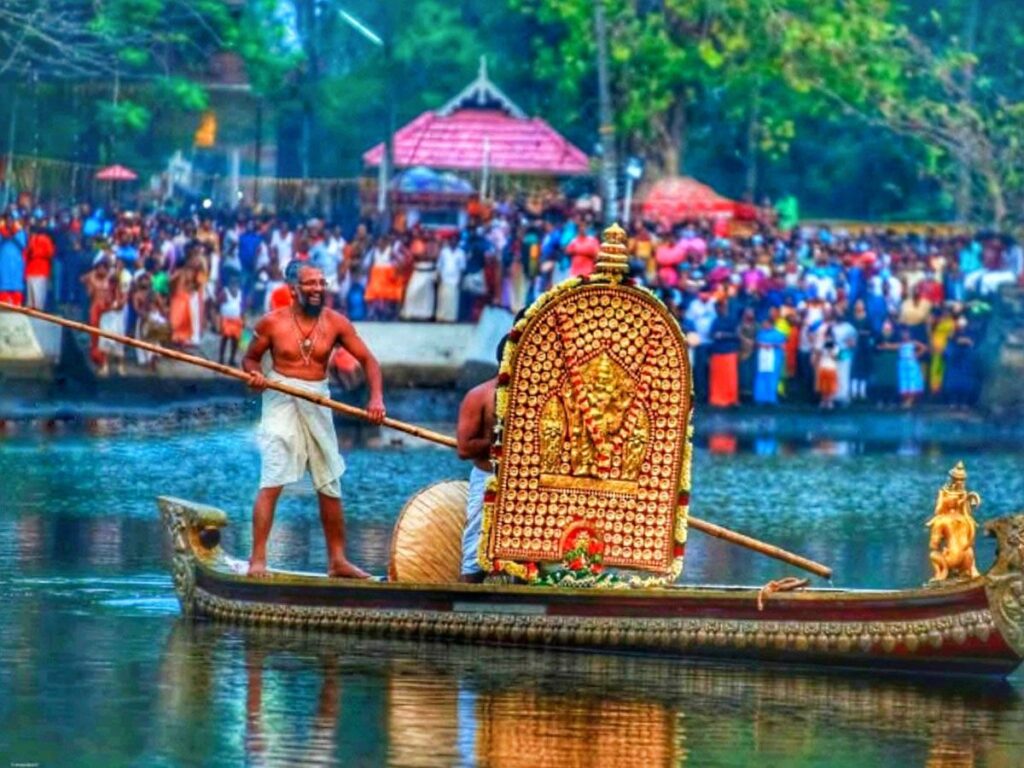
Arattupuzha Pooram Date 2024:
Legends say that during the Arattupuzha Pooram, all the gods and goddesses from neighboring temples assemble for a grand conclave. In the past, it is said that 108 deities participated, though today the number is around 23. This festival reflects the rich tapestry of traditions from Kerala.
Here are some of the key features of the Arattupuzha Pooram:
- Caparisoned Elephants: The festival features a majestic procession of elephants adorned with rich colorful decorative cloths and shimmering gold jewelry.
- Panchavadyam: Panchavadyam, a classical percussion ensemble that features five different musical instruments – maddalam (cylindrical drum), thimila (hour-glass shaped drum), ilathalam (cymbals), kombu (buffalo horn) and chenda (cylindrical drum beaten with two sticks) – is a highlight of the festival. The synchronized and energetic performance creates a powerful and captivating soundscape.
- Kudamattam: Kudamattam is a spectacular display of art forms like Kavadi (decorated arches), Theyyam (elaborate masked performances), and Pootham (folk dances with colorful costumes).
- Devamela (Divine Assembly): The most important ritual of the festival is the Devamela, where deities from various temples in Thrissur are brought to the Arattupuzha temple for a ceremonial meet. As many as 23 deities from different temples are brought here and worshipped.
- Aarattu (Holy Dip): The culmination of the festival is the Aarattu, a holy dip of the idol of the presiding deity, Lord Sastha, in the Puzha river. This marks the conclusion of the divine assembly and the return of the deities to their respective temples.
Read More>> Sree Padmanabhaswamy Temple: 8th CE Spiritual Wonder & Mystery
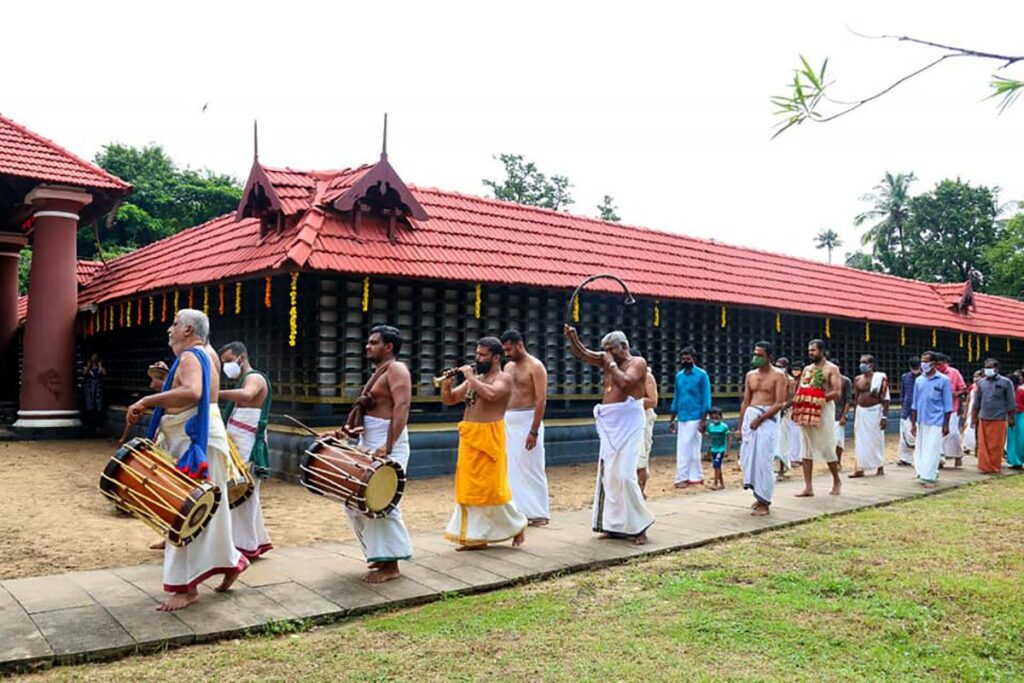
Arattupuzha Temple significance:
- Ancient Origins: Steeped in legend, the temple is believed to be over 1,000 years old, some accounts even say 3,000 years. This makes it an incredibly ancient site and a significant landmark in Kerala’s history.
- Devamela Festival: The temple is the center of the famed Arattupuzha Pooram, also known as “Devamela” or the “Mother of all Poorams.” This annual festival is a vibrant display of Kerala’s rich cultural traditions. It’s believed to be one of the oldest temple festivals in the state.
- Grand Spectacle: The Pooram festival is renowned for its sheer scale and grandeur. Traditionally, it involved over 100 deities from neighboring temples arriving in procession, though today the number is around 23. The festival features vibrantly decorated elephants, rhythmic drumming, and a colorful display of Kerala’s cultural heritage.
- Divine Connection: Legend associates the temple’s main deity, Saree Dharam Sastha, with Sage Vasishta, the spiritual guide to Lord Rama. This adds another layer of religious significance to the temple.
Read More>> Thiruvairanikulam Mahadeva Temple
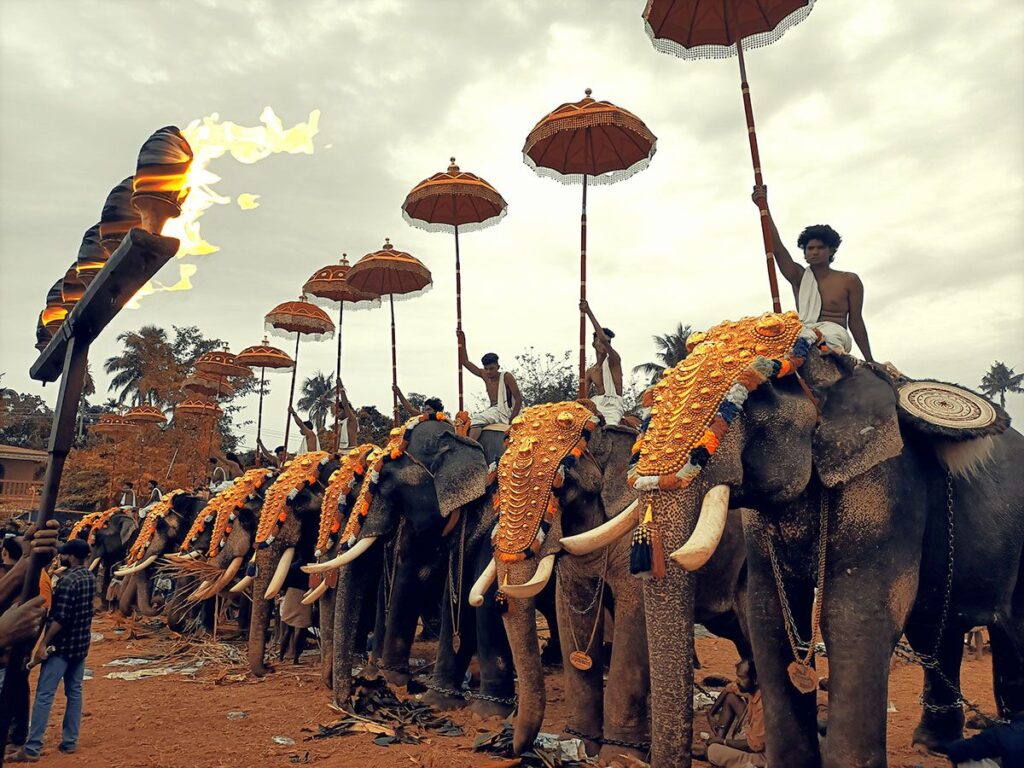
Arattupuzha Temple Timing & Rituals:
Temple Timings:
Generally, the Arattupuzha Temple is open for darshan (visitation) during the following timings:
- Morning: 5 AM to 9:30 AM
- Evening: 5 PM to 7 PM
It’s best to check with the temple authorities for any specific timings during poojas or festivals.
Arattupuzha Pooram Rituals:
The seven-day Pooram festival is a meticulous and colorful display of rituals and traditions. Here’s a glimpse into some of the key rituals:
- Flag Hoisting (Kodiyettu): The festival commences with the ceremonial hoisting of a flag, signifying the beginning of the festivities.
- Pandi Melam: Enchanting music played with traditional instruments like drums and cymbals fills the air throughout the festival.
- Shayana Pradosham: Special poojas and offerings are made during this auspicious time.
- Elephants with Caparisoned Parasols: One of the most striking visuals of the festival is the sight of numerous elephants adorned with decorative parasols and traditional attire.
- Devamela (The Gathering of Gods): A core ritual of the Pooram, Devamela witnesses the arrival of deities from neighboring temples to pay their respects to the presiding deity of Arattupuzha Temple, Lord Ayyappa. It’s a symbolic representation of the unity and harmony between these temples and their traditions.
- Arattu (Holy Bath): The grand finale of the Pooram is marked by the Arattu ritual. The sacred idols from various temples are taken in a procession to the Puzhakkal river for a holy bath, symbolizing the cleansing and renewal of the divine.
Read More>> Chottanikkara Temple Ernakulam Kerala
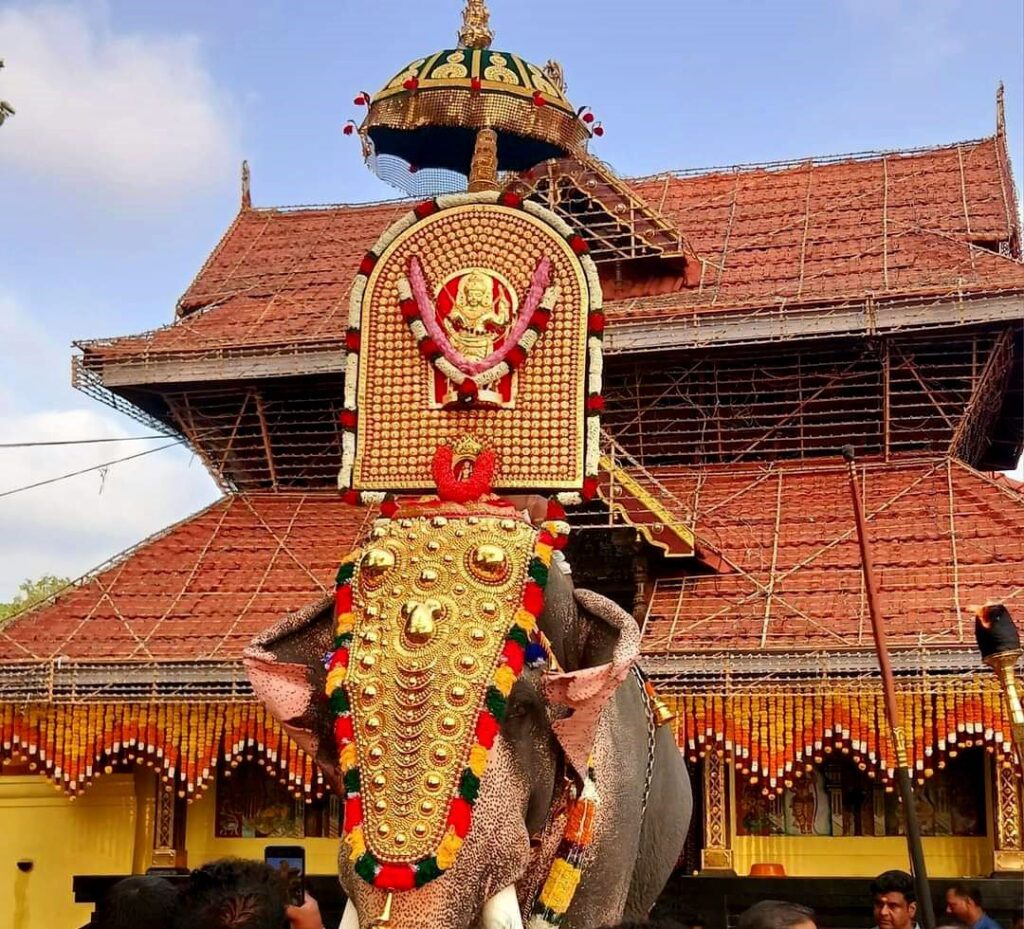
Places to visit near Arattupuzha Temple:
- Guruvayur Sri Krishna Temple: Located approximately 8 kilometers from Arattupuzha Temple, Guruvayur Temple is one of the most famous and sacred temples in Kerala dedicated to Lord Krishna. It is known for its architectural beauty and spiritual significance.
- Punnathur Kotta Elephant Sanctuary: Situated adjacent to the Guruvayur Temple, Punnathur Kotta is an elephant sanctuary where you can observe and interact with elephants. These elephants are offerings made by devotees to Lord Guruvayurappan.
- Chavakkad Beach: About 10 kilometers from Arattupuzha Temple, Chavakkad Beach is a serene and picturesque stretch of coastline known for its golden sands and tranquil atmosphere. It’s an ideal spot for a leisurely stroll or to witness a beautiful sunset.
- Palayur Church: Located around 10 kilometers away, Palayur Church is one of the oldest Christian churches in India, believed to have been established by Saint Thomas the Apostle in the 1st century AD. It holds historical and religious significance for Christians in Kerala.
- Kerala Kalamandalam: Situated in Cheruthuruthy, approximately 13 kilometers from Arattupuzha, Kerala Kalamandalam is a renowned center for learning and promoting traditional Kerala arts, including Kathakali, Mohiniyattam, and Koodiyattam. Visitors can witness performances and learn about Kerala’s cultural heritage.
- Thrissur Pooram Exhibition Ground: Thrissur, located about 16 kilometers from Arattupuzha, hosts the famous Thrissur Pooram festival, known for its grandeur and vibrant festivities. The exhibition ground adjacent to Vadakkunnathan Temple hosts various cultural and entertainment events during the festival season.
- Vadakkunnathan Temple: Located in Thrissur, about 16 kilometers from Arattupuzha, Vadakkunnathan Temple is an ancient Hindu temple dedicated to Lord Shiva. It is renowned for its classic Kerala temple architecture and hosts the Thrissur Pooram festival.
FAQ:
How old is the Arattupuzha Temple?
The Arattupuzha Temple is believed to be more than 1000 years old. Its rich history and cultural significance make it a revered place of worship.
Notably, the temple hosts the annual festival called Arattupuzha Pooram, which spans 7 days and typically takes place in March or April. During this vibrant festival, around 70 beautifully decorated elephants participate in a grand procession.
What makes the Arattupuzha Temple unique?
Unlike many other temples, the Arattupuzha Temple does not have a main deity. Instead, the deity sits in a serene posture, holding an “Amrutha Kalasa” (a vessel of nectar) in its right hand, resting on the right knee.
Legend has it that the deity embodies the divine potential of Guru Vasishta, who was the revered master of Lord Sri Rama.
What is the significance of the yearly Devamela festival?
The temple’s antiquity dates back 3000 years according to legends. It has been the host of the most ancient and well-known yearly Devamela.
During Devamela, all gods and goddesses assemble at Arattupuzha, creating a spiritually charged atmosphere.
The main deity, Saree Dharam Sastha, is worshipped during this auspicious festival.
Other FAQ’s:
- Where is Arattupuzha Temple located?
- Arattupuzha Temple is situated in the village of Arattupuzha, which is in Thrissur district, Kerala, India.
- Who is the presiding deity of Arattupuzha Temple?
- The presiding deity of Arattupuzha Temple is Lord Ayyappa, also known as Dharma Sastha or Ayyappan. He is considered a Hindu deity associated with wisdom, protection, and righteous living.
- What is the significance of Arattupuzha Temple?
- Arattupuzha Temple is one of the oldest and most revered temples in Kerala. It holds great religious and cultural significance, especially during the annual Arattupuzha Pooram festival, which attracts devotees and visitors from various parts of the state.
- When is the Arattupuzha Pooram festival celebrated?
- The Arattupuzha Pooram festival is celebrated annually during the Malayalam month of Meenam, which typically falls in March or April according to the Gregorian calendar.
- What are the main attractions of the Arattupuzha Pooram festival?
- The main attractions of the Arattupuzha Pooram festival include a grand procession featuring elaborately decorated elephants, traditional percussion ensembles, and colorful cultural performances. The highlight of the festival is the divine ‘Arattu’ ceremony, where idols of Lord Ayyappa and other deities are ritually cleansed in the nearby Arattupuzha River.
- Is there any historical significance associated with Arattupuzha Temple?
- Arattupuzha Temple has ancient origins and is steeped in Hindu mythology and folklore. According to local legends, the temple’s establishment is associated with the mythical event known as the ‘Divine Calling’ or ‘Devam Pattu’, wherein Lord Ayyappa and other deities descended upon Arattupuzha to bless the devotees.
- Are there any special rituals or customs observed at Arattupuzha Temple?
- Yes, Arattupuzha Temple follows various rituals and customs as per Hindu tradition. These include daily pujas (ritual worship), offerings, and special ceremonies during festivals and auspicious occasions.
- Is Arattupuzha Temple open to all visitors?
- Yes, Arattupuzha Temple is open to all devotees and visitors regardless of their caste, creed, or religion. However, visitors are expected to follow the temple’s rules and guidelines regarding dress code and behavior.
- Are there any accommodation facilities near Arattupuzha Temple?
- Yes, there are several accommodation options available near Arattupuzha Temple, including hotels, lodges, and guesthouses, where devotees and visitors can stay during their visit to the temple and the surrounding area.
How to reach Arattupuzha Temple:
By Air: The nearest airport to Arattupuzha Temple is Cochin International Airport (COK), located approximately 60 kilometers away. From the airport, you can hire a taxi or use other modes of transportation to reach Arattupuzha.
By Train: The nearest railway station to Arattupuzha Temple is Thrissur Railway Station, which is well-connected to major cities in Kerala and other parts of India. Thrissur Railway Station is about 17 kilometers away from Arattupuzha. From the railway station, you can hire a taxi or use local buses to reach the temple.
By Road: Arattupuzha is well-connected by road to various cities and towns in Kerala. Thrissur, the nearest major city, is around 17 kilometers away. You can reach Arattupuzha by taking a bus, hiring a taxi, or driving your own vehicle.
